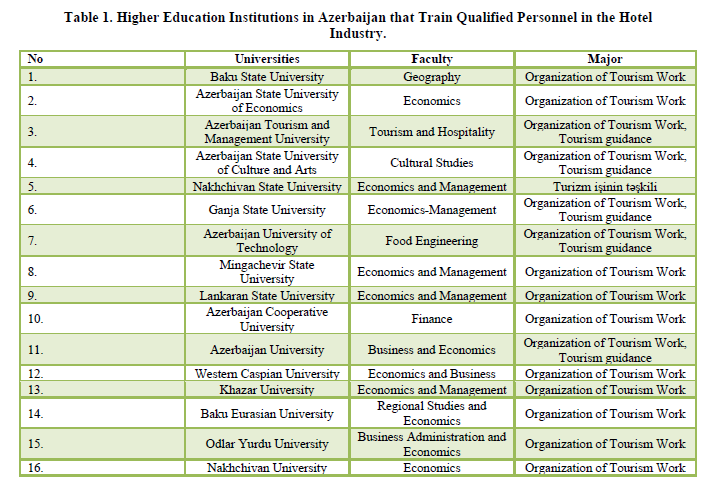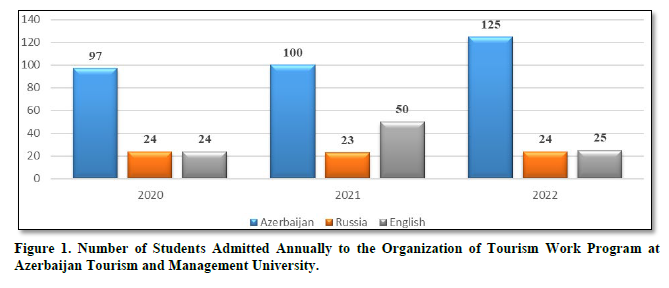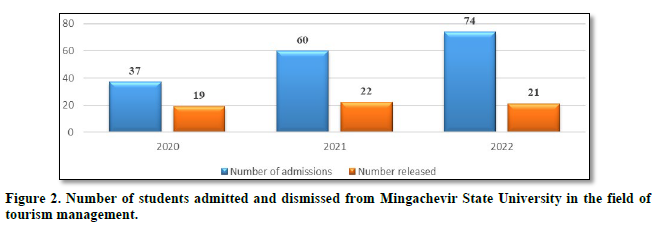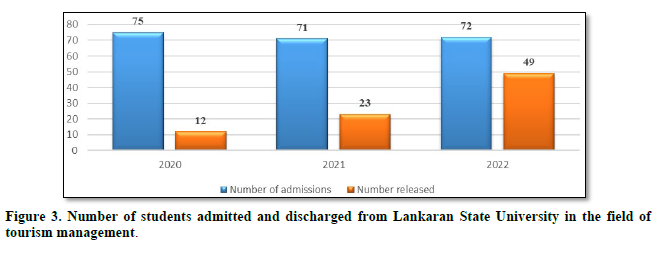2269
Views & Citations1269
Likes & Shares
Every year, many students apply to universities to specialize in fields related to the hospitality industry. In Azerbaijan, the main higher education institutions that train specialists at the bachelor’s and master’s levels for the hospitality industry include the Azerbaijan Tourism and Management University, Baku State University, the Azerbaijan State University of Culture and Arts, the Azerbaijan State Economic University, Nakhchivan State University, and others. One of the specialized universities that trains personnel in tourism and hospitality is the Azerbaijan Tourism and Management University (ATMU).
ATMU was established on December 22, 2014, by the decree of the President of the Republic of Azerbaijan, Ilham Aliyev, based on the Azerbaijan Tourism Institute (ATI), which had been operating since 2006 (CAN, 2004). ATMU is a higher education institution that provides training for specialists in tourism and management in the country. According to the decision of the Cabinet of Ministers of the Republic of Azerbaijan dated June 7, 2018, ATMU operates under the State Tourism Agency of the Republic of Azerbaijan. Currently, the university has 3 faculties and 8 departments (Table 1).

At ATMU, education is provided at the undergraduate, graduate, and doctoral levels, as well as through additional education programs. The university has a total of 1,980 students enrolled in undergraduate and graduate programs. Additionally, 52 students are enrolled in the doctoral program, and 27 students are participating in the additional education program. Since its establishment, a total of 4,481 students (3,799 undergraduates, 625 graduates, and 39 doctoral students) have graduated from Azerbaijan Tourism and Management University.
Azerbaijan Tourism and Management University was the first higher education institution in Azerbaijan to implement an international dual degree program. In 2007, a contract was signed with the IMC Krems University of Applied Sciences in Austria for the implementation of the Azerbaijan-Austria Tourism Program. Over the course of 15 years, this successful program has led to the graduation of 298 individuals, including 285 undergraduates and 13 graduates. These alumni are now contributing to the development of the tourism sector as specialists well-versed in both local and international tourism education. Students who successfully complete the program, which is taught by Austrian specialists, receive two diplomas-one from Azerbaijan Tourism and Management University and another from IMC Krems University of Applied Sciences (Table 1).
On November 20, 2019, Azerbaijan Tourism and Management University (ATMU) was awarded the ISO 9001:2015 - Quality Management System certification for its "Organization of Tourism Work" program. The awarding of this certification to ATMU demonstrates its effective management system and the implementation of an educational policy that meets international standards. On March 10, 2020, Azerbaijan Tourism and Management University was also awarded the "UNWTO.TedQual" international quality certification for its "Organization of Tourism Work" program by the World Tourism Organization (UNWTO). As the first higher education institution in the South Caucasus region to successfully pass the "UNWTO.TedQual" certification process, ATMU's achievement represents a significant step toward increasing the global competitiveness of tourism higher education in Azerbaijan. By joining the "UNWTO.TedQual" Network of Higher Education Institutions, ATMU gained the right for its academic staff and students to participate in exchange programs and also obtained opportunities for knowledge and experience exchange (Figure 1).

The Department of Tourism and Library-Information Activities at the Faculty of Cultural Studies of the Azerbaijan State University of Culture and Arts, taking into account the demands of society and the labor market in our country, trains highly qualified specialists at the bachelor's level in the fields of "Organization of Tourism Work" and "Tourism Guiding," and at the master's level in "Tourism and Hotel Management," with specializations in "Organization of Service in Social-Cultural Sectors," "Tourism Guide," and "Tourism and Social-Cultural Service." The education programs at both the undergraduate and graduate levels include approximately 120 courses in the fields of humanities, professional training for the specialization, and the specialization section. The teaching of these courses provides students with the necessary knowledge, skills, and competencies to study existing problems and processes in various areas of social activity and to solve both standard and non-standard issues related to their specialization.
Universities in Azerbaijan's regions also train qualified personnel for the tourism and hospitality industry. Compared to Baku, universities in the regions admit fewer students for tourism and hospitality programs. One of the main reasons for this is the lower interest in tourism and hospitality industry professions in the regions. To address this issue, it is necessary to raise awareness among students in regional schools about the profession, regularly organize excursions, and emphasize that the development of the tourism and hospitality industry will improve the economic situation and well-being in the districts. There are favorable conditions for the development of the tourism and hospitality industry in Azerbaijan's regions and for conducting practical training in the field. For example, Mingachevir State University offers elective courses in the "Organization of Tourism Work" program (60 credits, 11 courses) as determined by ATMU. The tourism direction is one of the leading areas of personnel training at MDU. To support this, business connections have been established with higher education institutions and the Tourism Agency. Additionally, cooperation has been set up with Haci Bayram Veli University in Turkey, which has rich experience in tourism personnel training. Within the framework of this collaboration, seminars and roundtables are regularly organized. As part of the cooperation with the Tourism Agency, a "Tourism Volunteers" group has been created.
As an example, looking at Mingachevir State University and Lankaran State University, it can be observed from the table below that the number of students admitted to the "Organization of Tourism Work" program at universities in the regions is greater than the number of graduates. This indicates that there are still certain gaps in the tourism and hospitality industry programs, and to fill these gaps and make the lessons more effective and interactive, specific methods and approaches should be utilized (Figure 2).

There is a high demand for tourism and hospitality graduates, and numerous academic institutions offer world-class hotel management and hospitality programs. While the United States dominates the rankings, there are several contenders from other countries with unique and specialized offerings for both students and the hospitality industry.
Cornell University (United States) has been a pioneer in the hospitality industry for nearly a century, since it introduced its hotel program in 1922. The close connection with the world-class Statler Hotel located on campus facilitates a rich learning experience. Approximately 200 students work closely with hospitality experts, applying their skills in all areas of hotel operations. They have an international study program arranged for third-year students to gain valuable overseas experience. Their student intake consists of nearly 960 undergraduates from more than 30 countries. Each year, 250 hospitality leaders participate in the courses. Every student undergoes at least one internship each year, and each receives 800 hours of industry experience before graduation, with access to over 1,200 job opportunities through the school's career office.
Ecole hôtelière de Lausanne (Switzerland), established in 1893, offers five academic programs ranging from bachelor's level to leadership-level specialties. Its ever-growing alumni network comprises 25,000 individuals who are valuable leaders and opportunities in the industry. In 2016, Ecole hôtelière de Lausanne had 2,608 students enrolled, representing a total of 107 nationalities. This diverse student body contributes to the rich learning environment provided by the renowned institution (Figure 3).

The key elements of industrialization are science, technology, and economics. Today, technology is based on scientific knowledge and requires a continuous innovative approach. Universities are the producers of innovative science, while industry is the creator of new technologies and economic development. The development of the tourism and hospitality industry in Azerbaijan has become an integral part of the state policy, viewed as an important factor for economic progress and growth. The increase in the number of hotels and hotel-type establishments compared to previous years (712 accommodation facilities in 2021) is an indicator of the development of the hospitality industry. Many universities now offer courses in tourism and hospitality to train qualified personnel in this field. Additionally, short-term training sessions are conducted within the framework of cooperation between the State Agency for Vocational Education and the State Tourism Agency to train skilled workers in the tourism sector.
In the hospitality industry, both theoretical and practical knowledge are essential for training skilled personnel. To achieve this, higher education institutions establish partnerships with various hotel establishments. As a result, students participate in various programs for volunteer and industrial practice. The main advantage of industrial practice is the creation of job opportunities for students who undergo training.
In the late 19th century, Switzerland opened the first school to train specialists for the hospitality industry, Ecole hoteliere de Lausanne. In the early 20th century, universities that opened at that time still offer two fundamental programs (hotel and tourism management), which are provided individually or jointly by respective schools. Switzerland remains a leader in tourism education. Following it, Spain, Ireland, the United States, the United Kingdom, and Australia are also key players. The main characteristic of education in tourism and hospitality is the combination of theory and practice. In many foreign schools, time is allocated not only for the theoretical part but also for practical experience. Specialized classrooms add specificity to education. For example, a classroom can be equipped like a hotel room, where students will be taught how to start cleaning and how to prepare beds, and see what a perfectly cleaned room should look like.
In the front office classroom, students can practice greeting guests and checking them in. In the bar classroom, they are taught how to mix drinks and serve them in appropriate glasses. In the restaurant classroom, a group of students is divided: some learn service, while others evaluate the work of their classmates. A small tourism office can also operate at the school level. Thus, research is conducted in the most realistic conditions. Typically, all hotel and tourism schools offer bachelor programs, postgraduate education, and various short-term programs, which lead to mastery.
At Azerbaijan Tourism and Management University, both theory and practice are equally emphasized. A "Resource Center" has been created in classroom 304, equipped with hotel resources for the students' practical lessons. This classroom includes a reception desk, bar section, round table, electronic board, and more. Setting up such a facility helps students understand the hotel environment and enables them to apply the theoretical knowledge they have gained in practice.
As universities and schools actively interact with each other, graduates of long-term programs have the opportunity to finish their education and obtain relevant diplomas from universities in Switzerland, the United Kingdom, the United States, and other countries. Almost every country has universities and schools related to hospitality and tourism business. In many countries, schools started to emerge in the 1980s in response to the increasing demand for hospitality specialists. In Cyprus, the tourism boom led to the creation of the Tourism and Hospitality College. Students at the hotel business department study for three or four years, while training for travel agency and airline managers lasts only two years. Graduates receive a college diploma and an international IATA (International Air Transport Association) certificate. A similar development occurred in Ireland: when the economic boom began and thousands of people were preparing to cross the country’s borders, tourism programs were introduced at Irish educational institutions. For example, the American College Dublin, in cooperation with Lynn University in the United States, offers a two-year training program for hospitality industry managers. The program includes modules on tourism and hotel management. After graduation, students receive a diploma accredited by the American Hotels and Motels Association, ensuring they will be welcomed anywhere in the industry. The European School of Economics in London offers a program with modules on tourism policy, the planning, principles, and practice of tour operators, tourism marketing, and management.
Tourism is an important sector for Turkey's economy, with tourism revenues accounting for 16.7% of exports. The development of the tourism and hospitality industry in Turkey is due to the professionalism of the staff in the sector. To this end, the Republic of Turkey prioritizes skilled workers in the tourism and hospitality industry and creates extensive opportunities for students studying in this field. Currently, Turkish higher education institutions such as Anadolu University, Akdeniz University, Atatürk University, Ege University, Balikesir University, Mersin University, and Haliç University offer bachelor’s and master’s degrees in tourism and hospitality.
Some of the specialized courses include hotel management, tourism guiding, food and beverage management, tourism management, destination management, and more. The main subjects offered in these programs include service and bar management, front office management, floor services management, food and beverage services management, meeting and conference management, sustainable tourism, catering services, and banquet management. Although there are differences in curricula among Turkish universities, many subjects are also taught in Azerbaijan’s higher education institutions.
The dynamic development of Azerbaijan’s tourism and hospitality industry emphasizes the need for skilled personnel capable of ensuring the long-term success of tourism enterprises and their competitiveness. Foreign experience clearly shows that to enhance the quality of professional preparation for tourism and hospitality specialists, close collaboration between employers and educational institutions is crucial. Unfortunately, in our country, this collaboration between industry enterprises and educational institutions is developing at a slow pace.
Additionally, hotel personnel and hospitality service workers note that graduates from specialized higher education institutions often lack practical skills, language proficiency, and computer program knowledge.
The staff at educational institutions highlight that the interest in participating in the development of educational standards, considering the professional standards of employers and labor market requirements, is weak. Therefore, close interaction between hotel and tourism enterprises and educational institutions should be considered in the following areas:
Determining the actual demand for hotel and tourism industry personnel and the required qualifications;
- Identifying the competencies required for each specialty
- Defining the types of work, job functions, and education levels required in the tourism and hospitality industry
- Formulating professional and educational standards based on industry frameworks;
- Joint development and improvement of educational standards aligned with established professional standards
- Organizing and managing the educational process at specialized institutions with new approaches;
- Accreditation of educational programs and institutions by the state as experts;
- Evaluation and certification of graduates’ qualifications;
- Updating educational content in line with new educational standards;
- Enhancing the qualifications of faculty members in specialized institutions;
- Conducting guest lectures and master classes for senior students.
- Collaboration between enterprises (employers) and specialized universities will help improve the quality of final qualification and coursework, strengthen joint scientific research, and enhance the status of vocational professions through practical training. Furthermore, this cooperation will ensure the training of specialists for the commissioning of new hotel facilities.
In summary, close collaboration between tourism and hospitality enterprises and educational institutions is necessary for the development of high-quality education and professional preparation for the tourism and hospitality industry. This cooperation should be pursued with an emphasis on modernizing the education sector, increasing the activity and initiative of hotel and tourism enterprises as clients of educational services. A significant step in this direction was the scientific seminar organized in 2017 at Divan Express Hotel, where Azerbaijan Tourism and Management University’s (ATMU) Department of Hotel and Restaurant Business and the Azerbaijan Tourism Association discussed the collaboration between higher education institutions and hotel enterprises. During the seminar, issues such as creating a career center within the university, improving sectoral finance, organizing one-week familiarization practices, and updating curricula every 2-3 years were discussed (Sorokina, 2009).
Hotel workers can be divided into three main groups based on job qualifications: management, staff working with guests, and support departments. The competence of these personnel is crucial for quality management. Hotel management must ensure that staff have the necessary qualifications and possess the knowledge and skills to perform their jobs excellently.
In addition, mandatory requirements for hospitality industry service personnel include:
Qualifications (for all categories of hotels)
All service staff must undergo professional training, which should match the services they provide. For example, workers dealing with hotel residents’ safety should be trained in food safety. 1.2. Knowledge of foreign languages. For 1-star hotels, reception and accommodation staff need to know one foreign language (the international communication language or the most commonly spoken language by the hotel’s guests in the region). For 2-star hotels, the requirements are similar. For 3-star hotels, all staff who interact with guests must know at least two international languages or other commonly used languages in the region. For 4-star hotels, the requirements are similar, but language proficiency should be at a higher level. For 5-star hotels, all guest-facing staff should be fluent in at least three foreign languages.
Given the broad scope of the tourism sector, the demand for qualified personnel continues to rise. Students who study tourism wish to pursue careers in either the tourism sector or other fields. As the table shows, the number of workers in Azerbaijan’s tourism and hospitality industry continues to increase year by year (Table 2).

In 2019, a scientific and practical seminar-discussion on the topic "Personnel and Service Issues in the Hotel Business and the Role of ATMU in Solving Them" was organized by the "Hotel and Restaurant Business" Department of the Azerbaijan Tourism and Management University (ATMU) under the Azerbaijan State Tourism Agency, in collaboration with the Azerbaijan Tourism Association (AZTA) at Divan Express Baku Hotel. The seminar was attended by representatives from ATMU, AZTA, including the Executive Director of AZTA, the Advisor to the Chairman of AZTA, the Director of Kurorti.ru, the Regional Head Manager of Ulu Hospitality, the General Manager of Sapphire Hotel Network, the General Manager of Ramada Plaza Ganja, the top manager of "New Baku" Hotel, the F&B Manager of "Qafqaz Point Hotel Baku," the Director of RHG, the Head Manager of the "MADO" network, the Manager of the MADO Nərimanov branch, and other hotel representatives. Based on the research and opinions of the representatives of these institutions, the following proposals were recorded:
Motivational factors should be established for both students and the industry
Selection criteria for sending students for internships should be defined; topics related to personnel and issues within organizations should be included in thesis work; evening courses on tourism and hotel management should be considered; the creation of a small hotel and restaurant for practical lessons at ATMU should be planned.
The involvement of foreign managers is recommended, but it should be conducted in collaboration with at least one local specialist (Sorokina, 2009).
Updating textbooks and books; organizing workshops; organizing tax-related services online and compiling a list of hotels.
Education is a process that allows individuals to understand and recognize themselves. In this process, learning and teaching actions take place in a well-organized environment through educational programs. Moreover, education is an essential process that ensures the adaptation of individuals and society to social and economic changes. It includes goals such as increasing employee productivity, preparing individuals for more responsible managerial positions, and ensuring service orientation. Education and training provide essential knowledge about the service and develop the skills and behaviors necessary to enhance employees’ service orientation. Furthermore, it improves service efficiency and quality, reduces staff turnover, and saves time and effort.
In 2022, the "Hotel and Restaurant Business" Department of the Azerbaijan Tourism and Management University organized a scientific-practical seminar on "Discussion of the Subjects in the New Educational Program with Business Leaders." The seminar continued in a discussion format between representatives from the industry and higher education institutions. The seminar included representatives from the State Tourism Agency, the Ministry of Youth and Sports, Quba Palace, Hilton Baku, Four Seasons Baku, Point Hotel Baku, Hyatt Regency Baku, Grand Midway, and New Baku Hotel, as well as faculty members from Azerbaijan State Economic University’s "Food Engineering" department, scientific staff from the Grape Growing and Winemaking Research Institute, and representatives from the Azerbaijan Food Safety Institute, Sun Tea Tea Factory LLC, AZFP CO LTD (Milla), Emsa Food, and Herba Flora companies.
They voiced their demands for qualified personnel in their respective sectors and highlighted the importance of the necessary skills and competencies for students. Additionally, the subjects introduced in the new curriculum were discussed, and proposals were made. As a result of the seminar, the importance of foreign language proficiency was emphasized, and it was suggested to introduce a specialized program in "Hotel Management" based on the needs of the market and similar to other countries (CAN, 2004).
In 2020, the Ministry of Science and Education of Azerbaijan replaced the bachelor’s degree program in "Tourism and Hotel Management" with "Organization of Tourism Work" at universities in Azerbaijan. The bachelor's degree program in "050810-Organization of Tourism Work" was developed in accordance with the Azerbaijani Republic’s "Law on Education," decisions of the Cabinet of Ministers, the "State Standard and Program for Higher Education," the "Regulations on the Content and Organization of Undergraduate Education," and the "Classification of Specialties in Higher Education." The main objectives of the program are as follows:
Defining the competencies of the graduates, the framework of the specialty, teaching and learning methods for the subjects, assessment methods, training results, and the infrastructure and human resources required for staff preparation, including opportunities for internships, employment, and further education;
Informing students and employers about the knowledge and skills acquired by the graduates and the learning outcomes;
Providing information to experts involved in evaluating the compliance of the staff preparation process with this program (GURSOY & Gönül, 2001).
The program is mandatory for all higher education institutions in Azerbaijan offering bachelor’s degrees in the specialty, regardless of their ownership or organizational-legal form. In addition to the mandatory subjects defined by the State Standard, there is a block of elective subjects determined by the universities, with 60 credits allocated to them. These subjects are selected in accordance with the areas required by hotel establishments and international curricula.
Thus, the innovative development of the country requires not only labor but also talented personnel capable of solving knowledge-intensive tasks and creating optimal integration of the university. Education is widely recognized as the driving force behind sustainable economic development. The government understands the problem of the significant gap between theoretical knowledge and the lack of practical lessons, which is why in recent years, universities have actively supported initiatives to sign agreements with industrial enterprises and involve students in internships in the industry. They actively support the engagement of trainees in masterclasses, open lectures, and field research. To achieve better results, the government and business should create an environment that enables the development of the industry and the economy as a whole. The formation of a system for training specialists requires the immediate decision-making in the field of innovation in human resources policy. This means that modern universities should be excellent educational institutions engaged in preparing personnel for their specific fields, creating mechanisms for transferring the scientific work of young specialists to the market. Universities should take an active role in the development of the economy by generating scientific and technological knowledge and innovations, and by evolving in the tourism and hospitality industry for the development of our country.
- State standard of higher education special education program of bachelor’s degree Bakı (2020).
- CAN. N., (2004). Learning Development and Effective Learning Behaviors, Journal of the Institute of Social Sciences, Dizgi and Basque Erdjies University 16.
- GURSOY, Gönül (2001). Service Intraeducational Processing Should Be Veritable Anakhtar Dergisi National Productivity Center Monthly Broadcasting Body Doctor Year, 22.
- Sorokina A.B. (2009). Organization of service in hotels and tourist complexes. Moscow, Alf M 213-21.
- https://www.atmu.edu.az/az/web/post/626atmu.edu.az
- https://unikal.az/news/209959/mehmanxana-biznesinde-kadr-ve-servis-problemleri-movzusunda-elmi-praktik-konfrans-oldu-foto?ysclid=ldjasv6uw6412854964 ktik konfrans oldu - FOTO - Unikal.az
- (https://azertag.az/xeber/Ali_mekteblerle_muessiseler_arasinda_elaqeler_mohkemlendirilir-1121432?ysclid=ldjaqrq3a3748004159rtag.az
- http://atmu.edu.az/
- https://www.stat.gov.az/source/tourism/?ysclid=ldin1eunj1678879506




